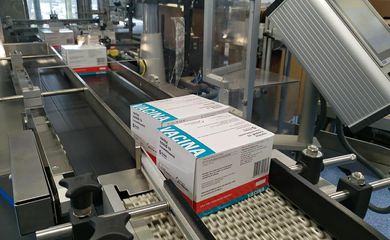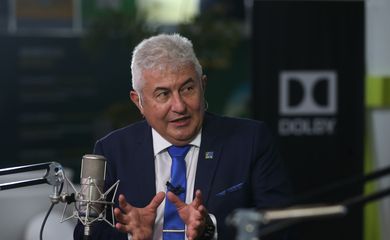Fiocruz key to Brazil’s vaccine, drug production for 122 years

Early in 1900, the city of Rio de Janeiro was facing an epidemic of yellow fever and bubonic plague. To contain the advance of these diseases 122 years ago, the government inaugurated the Federal Serum Therapy Institute. The step marks the beginning of the history of the Oswaldo Cruz Foundation, also known as Fiocruz.

In 1908, the Serum Therapy Institute was renamed after Dr. Oswaldo Cruz, the bacteriologist who was the institute’s first scientific director and later on its director-general. The transformation of the institute into a foundation, including the incorporation of a number of scientific research facilities and the production of drugs and vaccines took place in 1970, when a decree established the creation of the Oswaldo Cruz Institute Foundation.
In the early years, scientists developed serums and vaccines in a small building on a farm in Manguinhos—a place seen as bucolic back then, but located today next to Avenida Brasil, the busiest thoroughfare leading to downtown Rio de Janeiro, where about 250 thousand vehicles pass by every day.
Historian Simone Kropf, of the House of Oswaldo Cruz, tasked with preserving the history of Fiocruz, says that early in the last century the farm where the Serum Therapy Institute operated was a large site and Oswaldo Cruz decided to build a castle as a symbol of science. "The Moorish Castle [Castelo Mourisco] is a hallmark of the institute and of public health in Brazil. It is much more than an imposing construction. It is a living castle open to society."
The Castelo Mourisco was inaugurated in 1918. The building is 50 meters (164 feet) high and its architecture features mixed styles with an English touch in the two towers and Arab inspiration in the walls and windows, in addition to French mosaics and Portuguese tiles.
Over time, the foundation has expanded. It can found throughout all five regions of Brazil, with facilities across ten states and the Federal District and partnerships with scientific institutions in 50 countries and international organizations, such as the World Health Organization (WHO).
As it stands today, about 5 thousand people work at Fiocruz. Employee Silvia Motta (61) joined the institute when she was 23. Today, 38 years later, she runs the foundation’s daycare center and cannot imagine her life away from Fiocruz.
“Working at the foundation, I feel as if I were part of the development of the Brazilian health care system. I take care of the sons and daughters of the researchers who create vaccines and medicines distributed countrywide. The work of the daycare center helps researchers focus on their studies, because they know their children are being taken good care of.”
Motta’s pride can be explained in figures. The foundation is the world’s largest producer of the yellow fever vaccine. The institute also produces inoculation against a wide range of diseases—such as measles, mumps, rubella, polio, and COVID-19. Last year alone, its technological complex delivered 233 million doses of vaccines to Brazil’s National Immunization Program.
Expansion
In the next few years, the Bio-Manguinhos vaccine production complex will be given a new plant, currently under construction in Santa Cruz, western Rio de Janeiro. At the site, 120 million vaccine vials may be manufactured every year, boosting the country’s autonomy in the sector.
“We’ll incorporate new vaccines and slash import costs. The complex should allow us to implement new projects already under development by Fiocruz to fight neglected diseases, which usually affect the poor more severely.”
Besides vaccines, Fiocruz also manufactures medicines. The production is carried out at the Rio-based Farmanguinhos laboratory, the federal government’s top supplier of drugs, boasting a production capacity of more than 2.5 billion pills a year.
The coordinator of Technological Development of Farmanguinhos, Alessandra Esteves, says the laboratory plays an instrumental role for the Ministry of Health. Domestic production serves to meet the demand of Brazil’s Unified Public Care System—the SUS—and also boosts the economy.
“It is very important for the government to master the technology and production of medicines. In addition to national sovereignty, it helps create jobs. The work of Farmanguinhos is key for the well-being of the people and also for the economic development of the country.”
The domestic production of medicines and vaccines is made possible thanks to the work of researchers at Fiocruz. Every year, approximately 800 scientific articles are written by the institute. These studies help deal with diseases such as AIDS, malaria, tuberculosis, leprosy, measles, and meningitis.
Fiocruz Director Tânia Araújo says these studies enable the creation of new drugs and vaccines, like the one being tested to combat schistosomiasis and fasciolosis. “Throughout history, we’ve had a wide number of achievements, like the eradication of smallpox and the discovery of Chagas disease. Ongoing investment gives the foundation a chance to keep offering quality medicines to the population.”
Professional qualification
Fiocruz is also active in professional training. Today, the institute offers 48 master’s and doctoral programs, in addition to 31 residency courses in medical nursing and a number of other professional fields. Cristiani Machado, vice-president for Education, Information, and Communication at Fiocruz, says the idea of training new professionals was first conceived by Dr. Oswaldo Cruz himself.
“He believed that just producing medicines and vaccines would not be enough to improve people’s health. In Oswaldo Cruz’s view, scientists need to be prepared for the future, which is why he decided the institute would also be a teaching center.”
Fiocruz President Nísia Trindade says the future of Brazil is connected to the future of the foundation. “The pandemic has shown us that continuously investing in science, technology, and education is fundamental. For this reason, the integrated work done by Fiocruz for the benefit of society is extremely important.”



